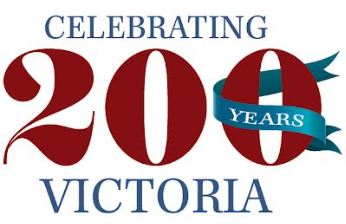Editor’s note: This is another in an ongoing series of articles we call “Marking History” looking at the stories behind the hundreds of historic markers scattered about the Crossroads.
Lorenzo Dow Heaton was a well-to-do businessman — he owned a drugstore in Victoria and lived in one of the finest houses in town.
As a hobby, Heaton examined mineral deposits along creeks and rivers in the Victoria area. He discovered oil before any major drilling in Texas got underway. He knew full well the value of his discovery, but he couldn’t quite secure the backing of financiers to drill.
The Lorenzo Dow Heaton home stands at 307 S. Bridge St., across from the Victoria Police Department’s downtown headquarters.
A historical marker outside the Southern Colonial home pays homage to the native New Yorker who bought the home in 1875 and owned Heaton Bros. Pharmacy, once located on Main Street.
Sometime after 1875, Heaton, an amateur mineralogist, discovered oil in the Victoria area, according to Roy Grimes’ “300 years in Victoria County.”
“L.D. Heaton, a pioneer Victoria druggist and one of the city’s more progressive citizens, who came from Potsdam, N.Y., had tried to interest Eastern capital in the oil and pottery prospects of this county, and at one time had the Chemical National Bank of New York in the notion of drilling here,” Grimes wrote, “but something arose to interfere with those plans.”
Oil was discovered in Texas in the 1860s, but the discovery was “modest,” according to the American Oil & Gas Historical Society.
“The first Texas oil boom was in June 1894, when the Corsicana oil field was discovered by a drilling contractor hired by the city to find water,” the society noted.
Victoria’s brief foray into the oil business came about in a similar manner, according to Grimes.
“One of the first wildcatters [a prospector who sinks exploratory oil wells] appears to have been the City of Victoria itself, although the city did not intend to enter the oil business in 1909 when a contractor was hired to drill two artesian wells along the Guadalupe River,” Grimes wrote in 1968.
The dig for the first water well proved promising for the discovery of oil, but it did not deliver. No oil was found, and Victoria dropped out of the oil business, Grimes wrote.
Heaton kept a jar of oil on display in his drugstore “that was said to have come from seep along Dry Creek a few miles southwest of the city.”
As it turned out, that was all the oil Heaton would ever claim.
Meanwhile, in 1889, two advancements made their debut in Victoria: citywide telephones were installed and streetcars began operation.
Streetcars, or street railways, were mule-drawn conveyances that ran on rails through downtown and the surrounding area.
Heaton, whose drugstore had the new telephone number 49, was president of the board charged with creating the street railway in Victoria.
The Nov. 11, 1889, Advocate reported:
“It was difficult for spectators who gathered on the corner of Main and Constitution Streets on Monday afternoon to determine which was the most interesting, the beautiful car, the beautiful small mule or the handsome little driver. The trio brought numbers to the corner, and a good load seated themselves in the car, but the mule was not inclined to proceed, he preferred to go the other way in crawfish fashion.”
The mule finally “got off alright” and the streetcar was a success.
Heaton also served as fire chief for the city near the turn of the century, when the fire department was a volunteer unit.
It was considered a civic duty and an honor to serve as chief, Tom Fite wrote in Grimes’ book. The chief was an elected official in a powerful position.
The department was “a potent force in local politics,” Fite wrote, and was growing rapidly in the last years of the 1800s and early years of the 1900s — just a few decades removed from the use of leather bucket brigades.
In the spring of 1907, at the age of 68, Heaton died of “complications of diseases, which no medical skill could avert,” his March 20 obituary in the Advocate reported.
“During the past 37 years Mr. Heaton had been one of our leading citizens,” the Advocate reported. “He was perfectly honest and honorable in all his dealings.”
It is certain Heaton lived during years of growth in Victoria and is ranked among the early businessmen who nurtured important advances.
All the while that jar of oil — that missed opportunity, perhaps — was exhibited in his store on Main Street.


Recent Comments